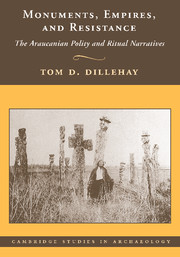Book contents
- Frontmatter
- Contents
- Figures
- Preface
- INTRODUCTION
- PART ONE PROSPECTS AND PATTERNS
- ONE PURPOSES, SETTINGS, AND DEFINITIONS
- TWO SHAPING ANALOGICAL AND CONCEPTUAL PERSPECTIVES
- THREE ARAUCANIAN PREHISTORY AND HISTORY: OLD BIASES AND NEW VIEWS
- FOUR IMBRICATING SOCIAL, MATERIAL, METAPHORICAL, AND SPIRITUAL WORLDS
- FIVE THE ETHNOGRAPHIES OF KUEL, NARRATIVES, AND COMMUNITIES
- SIX AN ARCHAEOLOGICAL VIEW OF KUEL AND REHUEKUEL
- PART TWO ANALYSIS AND INTERPRETATION
- Appendix One Ethnographic Ritual Narratives at Hualonkokuel and Trentrenkuel
- Appendix Two Radiocarbon Dates and Thermoluminescence Dates
- References Cited
- Index
FIVE - THE ETHNOGRAPHIES OF KUEL, NARRATIVES, AND COMMUNITIES
Published online by Cambridge University Press: 27 July 2009
- Frontmatter
- Contents
- Figures
- Preface
- INTRODUCTION
- PART ONE PROSPECTS AND PATTERNS
- ONE PURPOSES, SETTINGS, AND DEFINITIONS
- TWO SHAPING ANALOGICAL AND CONCEPTUAL PERSPECTIVES
- THREE ARAUCANIAN PREHISTORY AND HISTORY: OLD BIASES AND NEW VIEWS
- FOUR IMBRICATING SOCIAL, MATERIAL, METAPHORICAL, AND SPIRITUAL WORLDS
- FIVE THE ETHNOGRAPHIES OF KUEL, NARRATIVES, AND COMMUNITIES
- SIX AN ARCHAEOLOGICAL VIEW OF KUEL AND REHUEKUEL
- PART TWO ANALYSIS AND INTERPRETATION
- Appendix One Ethnographic Ritual Narratives at Hualonkokuel and Trentrenkuel
- Appendix Two Radiocarbon Dates and Thermoluminescence Dates
- References Cited
- Index
Summary
In the last chapter, I presented information on the Araucanian's religion, ideology, and sources and uses of indigenous knowledge and how they relate to kuel and other cultural landscapes and to social history. This chapter presents an interpretative description of the ethnographic knowledge specifically related to the function, meaning, and effectiveness of kuel and rehuekuel. It remains clear from the culture memory and fading use of mounds by communities in the Purén and Lumaco area that the primary sources of knowledge about them are the machi and that kuel and rehuekuel are linked primarily to public congregation and political discourse, to fertility and healing rites, and to kinship linkages between the living, ancestors, and deities. As presented below, various informants provide rich data on the material, spatial, and temporal dimensions of mound building and mound use and on the names and meanings of individual kuel and rehuekuel. Especially significant are two long ethnographic ritual dialogues that I recorded in the field between shamans and kuel, which reveal specific historical functions and meanings of mounds that often refer to the suffering brought by increased deaths and illnesses derived from prolonged contact with the Spanish and Chileans. The following data have been collected over a thirty-year period from more than two hundred informants from many different communities scattered throught the Araucanian region. Although primarily synchronic in nature, these data provide a comparative support base for analysis of the ethnohistorical and archeological records.
- Type
- Chapter
- Information
- Monuments, Empires, and ResistanceThe Araucanian Polity and Ritual Narratives, pp. 216 - 274Publisher: Cambridge University PressPrint publication year: 2007

